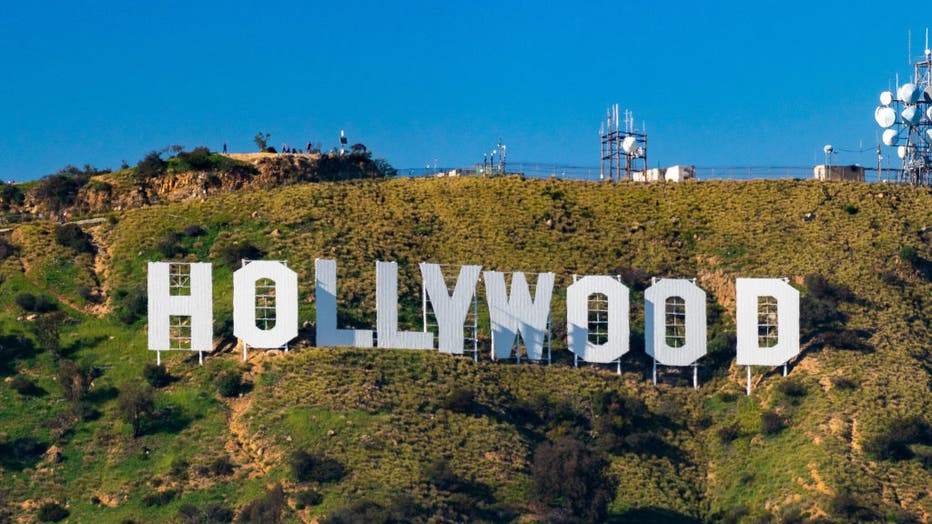Hollywood writers' strike begins, halting tv and film production
LOS ANGELES - Film and television sets in Hollywood went dark Tuesday after the Writers Guild of America voted to go on strike.
The leaders of the Writers Guild of America's West Coast and East Coast branches announced Monday night that contract talks had again broken down, and the union officially went on strike when its contract expired at 12:01 a.m. Tuesday.
Picketers were seen outside numerous studios, including Amazon's in Culver City, CBS' Studio City lot, Television City, The Walt Disney Co.'s corporate headquarters in Burbank, the Fox Studio Lot, Netflix's Hollywood headquarters, Paramount Studios in Hollywood, Sony Studios in Culver City, Universal Studios and Warner Bros. in Burbank.
The strike will disrupt work on hundreds of movies, scripted television series, late-night talk shows and streaming productions. The late-night talk shows are likely to feel the most immediate impact, with shows such as "Jimmy Kimmel Live," which is shot in Hollywood, expected to go dark, along with programs including "The Late Show with Stephen Colbert," "Late Night with Seth Meyers" and "The Tonight Show Starring Jimmy Fallon." NBC's "Saturday Night Live" could also quickly fall victim to the strike.
Prior to Monday night's development, WGA members voted overwhelmingly earlier this month to authorize a strike if labor negotiations broke down. According to the Writers Guild of America, 97.8% of members who cast ballots supported the strike-authorization vote.
A total of 9,218 union members cast ballots, representing nearly 79% of the WGA's membership.
"Our membership has spoken," according to a union announcement of the voting results earlier in the month. "Writers have expressed our collective strength, solidarity and the demand for meaningful change in overwhelming numbers. Armed with this undeniable demonstration of unity and resolve, we will continue to work at the negotiating table to achieve a fair contract for all writers."
The Alliance of Motion Picture and Television Producers, which represents the studios, issued a statement before the voting results were even announced, saying the approval was "inevitable" and urging continued talks to avert a work stoppage.
"A strike authorization vote has always been part of the WGA's plan, announced before the parties even exchanged proposals," according to the AMPTP prior to Monday's announcement. "Its inevitable ratification should come as no surprise to anyone. Our goal is, and continues to be, to reach a fair and reasonable agreement. An agreement is only possible if the guild is committed to turning its focus to serious bargaining by engaging in full discussions of the issues with the companies and searching for reasonable compromises."

The WGA last went on strike in 2007-08, remaining off the job for 100 days and grinding Hollywood production to a halt. That strike was precipitated over compensation for what was then termed "new media," with Internet streaming beginning to reshape the entertainment landscape.
Various estimates from different organizations estimated that the 100-day strike cost the local economy between $2 billion and $3 billion.
The WGA last week issued what it calls "strike rules" in case a walkout is called. The instructions for union members essentially bar them from doing any writing for studios being struck, or conducting any negotiations on future writing projects. The rules also direct union members to honor all WGA picket lines, perform assigned "strike-support" duties and inform the union of any "strikebreaking activity."
Among the issues on the bargaining table -- the WGA is pushing for increases in pay and residuals, particularly over streaming content. The guild is specifically calling for higher residual pay for streaming programs that have higher viewership, rather than the existing model that pays a standard rate regardless of a show's success. The union is also calling for industry standards on the number of writers assigned to each show.
Studios have pushed back on some union claims, noting that the entire industry is facing budget constraints and pointing to the thousands of layoffs currently underway at the Walt Disney Co. as a prime example. The studios also say writers' residuals have increased in recent years, powered largely by amounts earned through "new media."



